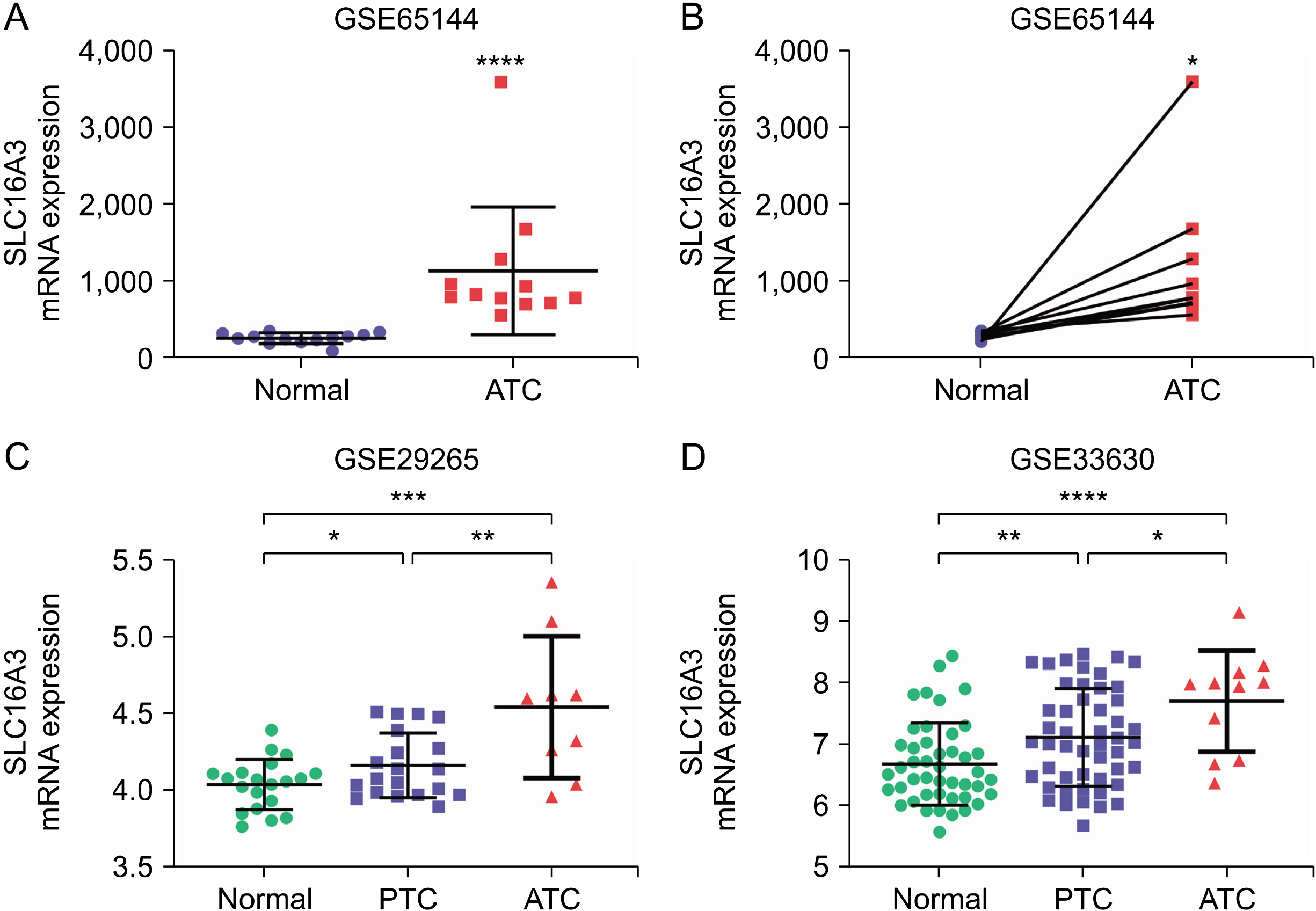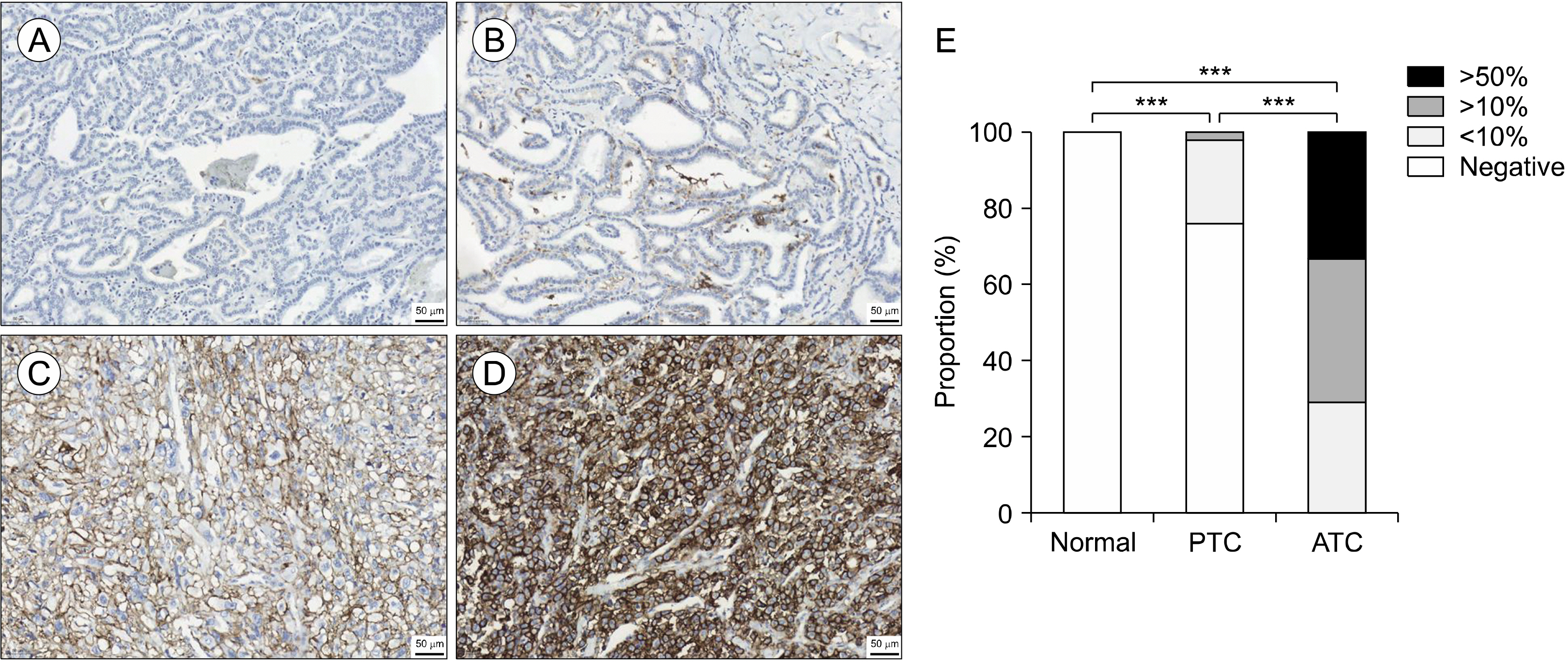Int J Thyroidol.
2024 Nov;17(2):272-276. 10.11106/ijt.2024.17.2.272.
Monocarboxylate Transporter 4 Expression in Thyroid Cancer
- Affiliations
-
- 1Divsion of Endocrinology and Metabolism, Department of Internal Medicine, Asan Medical Center, University of Ulsan College of Medicine, Seoul, Korea
- 2Department of Medicine, University Hospitals Cleveland Medical Center, Case Western Reserve University, Cleveland, Ohio, USA
- 3Department of Pathology, Asan Medical Center, University of Ulsan College of Medicine, Seoul, Korea
- KMID: 2561607
- DOI: http://doi.org/10.11106/ijt.2024.17.2.272
Abstract
- Background and Objectives
Monocarboxylate transporter 4 (MCT4) transmembrane proteins are encoded by SLC16A3 and control lactate metabolism to promote tumor growth.
Materials and Methods
Gene expression of SLC16A3 encoding MCT4 was analyzed in the database of Gene Expression Omnibus. Protein expression of MCT4 was evaluated using immunohistochemical staining in 138 papillary thyroid carcinomas (PTCs) and 21 anaplastic thyroid carcinomas (ATCs).
Results
The mRNA expression of SLC16A3 was significantly higher in ATCs compared with PTCs and normal thyroid tissue (p<0.01, and p<0.001, respectively). Normal thyroid tissue did not express MCT4 in immunohistochemical staining compared with ATC that was 100% positive for MCT4 protein expression. The MCT4 expression in ATCs was significantly enhanced compared with that in PTC (p<0.001).
Conclusion
MCT4 expression is associated with de-differentiation and might be helpful as a biomarker and therapeutic target for thyroid cancer.
Keyword
Figure
Reference
-
References
1. Payen VL, Mina E, Van Hee VF, Porporato PE, Sonveaux P. 2020; Monocarboxylate transporters in cancer. Mol Metab. 33:48–66. DOI: 10.1016/j.molmet.2019.07.006. PMID: 31395464. PMCID: PMC7056923.2. Javaeed A, Ghauri SK. 2019; MCT4 has a potential to be used as a prognostic biomarker - a systematic review and meta-analysis. Oncol Rev. 13(2):403. DOI: 10.4081/oncol.2019.403. PMID: 31410246. PMCID: PMC6661531.3. Pérez-Tomás R, Pérez-Guillén I. 2020; Lactate in the tumor microenvironment: an essential molecule in cancer progression and treatment. Cancers (Basel). 12(11):3244. DOI: 10.3390/cancers12113244. PMID: 33153193. PMCID: PMC7693872.4. Nakayama Y, Torigoe T, Inoue Y, Minagawa N, Izumi H, Kohno K, et al. 2012; Prognostic significance of monocarboxylate transporter 4 expression in patients with colorectal cancer. Exp Ther Med. 3(1):25–30. DOI: 10.3892/etm.2011.361. PMID: 22969839. PMCID: PMC3438655.5. Curry JM, Tuluc M, Whitaker-Menezes D, Ames JA, Anantharaman A, Butera A, et al. 2013; Cancer metabolism, stemness and tumor recurrence: MCT1 and MCT4 are functional biomarkers of metabolic symbiosis in head and neck cancer. Cell Cycle. 12(9):1371–84. DOI: 10.4161/cc.24092. PMID: 23574725. PMCID: PMC3674065.6. Bisetto S, Whitaker-Menezes D, Wilski NA, Tuluc M, Curry J, Zhan T, et al. 2018; Monocarboxylate transporter 4 (MCT4) knockout mice have attenuated 4NQO induced carcinogenesis; a role for MCT4 in driving oral squamous cell cancer. Front Oncol. 8:324. DOI: 10.3389/fonc.2018.00324. PMID: 30211114. PMCID: PMC6120975.7. Kim Y, Choi JW, Lee JH, Kim YS. 2015; Expression of lactate/H(+) symporters MCT1 and MCT4 and their chaperone CD147 predicts tumor progression in clear cell renal cell carcinoma: immunohistochemical and The Cancer Genome Atlas data analyses. Hum Pathol. 46(1):104–12. DOI: 10.1016/j.humpath.2014.09.013. PMID: 25456395.8. Izumi H, Takahashi M, Uramoto H, Nakayama Y, Oyama T, Wang KY, et al. 2011; Monocarboxylate transporters 1 and 4 are involved in the invasion activity of human lung cancer cells. Cancer Sci. 102(5):1007–13. DOI: 10.1111/j.1349-7006.2011.01908.x. PMID: 21306479.9. Gallagher SM, Castorino JJ, Wang D, Philp NJ. 2007; Monocarboxylate transporter 4 regulates maturation and trafficking of CD147 to the plasma membrane in the metastatic breast cancer cell line MDA-MB-231. Cancer Res. 67(9):4182–9. DOI: 10.1158/0008-5472.CAN-06-3184. PMID: 17483329.10. Khatami F, Payab M, Sarvari M, Gilany K, Larijani B, Arjmand B, et al. 2019; Oncometabolites as biomarkers in thyroid cancer: a systematic review. Cancer Manag Res. 11:1829–41. DOI: 10.2147/CMAR.S188661. PMID: 30881111. PMCID: PMC6395057.11. de la Cruz-López KG, Castro-Munoz LJ, Reyes-Hernandez DO, Garcia-Carranca A, Manzo-Merino J. 2019; Lactate in the regulation of tumor microenvironment and therapeutic approaches. Front Oncol. 9:1143. DOI: 10.3389/fonc.2019.01143. PMID: 31737570. PMCID: PMC6839026.12. Zhao B, Aggarwal A, Im SY, Viswanathan K, Landa I, Nehs MA. 2022; Effect of lactate export inhibition on anaplastic thyroid cancer growth and metabolism. J Am Coll Surg. 234(6):1044–50. DOI: 10.1097/XCS.0000000000000226. PMID: 35703795.13. Jeon MJ, You MH, Han JM, Sim S, Yoo HJ, Lee WK, et al. 2020; High phosphoglycerate dehydrogenase expression induces stemness and aggressiveness in thyroid cancer. Thyroid. 30(11):1625–38. DOI: 10.1089/thy.2020.0105. PMID: 32438862. PMCID: PMC7869887.14. Curry JM, Tassone P, Cotzia P, Sprandio J, Luginbuhl A, Cognetti DM, et al. 2016; Multicompartment metabolism in papillary thyroid cancer. Laryngoscope. 126(10):2410–8. DOI: 10.1002/lary.25799. PMID: 26666958. PMCID: PMC4909595.15. Nahm JH, Kim HM, Koo JS. 2017; Glycolysis-related protein expression in thyroid cancer. Tumour Biol. 39(3):1010428317695922. DOI: 10.1177/1010428317695922. PMID: 28347233.16. Sung TY, Kim M, Kim TY, Kim WG, Park Y, Song DE, et al. 2015; Negative expression of CPSF2 predicts a poorer clinical outcome in patients with papillary thyroid carcinoma. Thyroid. 25(9):1020–5. DOI: 10.1089/thy.2015.0079. PMID: 26148673.17. Liberti MV, Locasale JW. 2016; The Warburg effect: how does it benefit cancer cells? Trends Biochem Sci. 41(3):211–8. DOI: 10.1016/j.tibs.2015.12.001. PMID: 26778478. PMCID: PMC4783224.18. Halestrap AP, Meredith D. 2004; The SLC16 gene family-from monocarboxylate transporters (MCTs) to aromatic amino acid transporters and beyond. Pflugers Arch. 447(5):619–28. DOI: 10.1007/s00424-003-1067-2. PMID: 12739169.19. Dimmer KS, Friedrich B, Lang F, Deitmer JW, Broer S. 2000; The low-affinity monocarboxylate transporter MCT4 is adapted to the export of lactate in highly glycolytic cells. Biochem J. 350 Pt 1(Pt 1):219–27. DOI: 10.1042/bj3500219. PMID: 10926847. PMCID: PMC1221245.20. Romero-Garcia S, Moreno-Altamirano MM, Prado-Garcia H, Sanchez-Garcia FJ. 2016; Lactate contribution to the tumor microenvironment: mechanisms, effects on immune cells and therapeutic relevance. Front Immunol. 7:52. DOI: 10.3389/fimmu.2016.00052. PMID: 26909082. PMCID: PMC4754406.21. Wen SS, Zhang TT, Xue DX, Wu WL, Wang YL, Wang Y, et al. 2019; Metabolic reprogramming and its clinical application in thyroid cancer. Oncol Lett. 18(2):1579–84. DOI: 10.3892/ol.2019.10485. PMID: 31423225. PMCID: PMC6607326.
- Full Text Links
- Actions
-
Cited
- CITED
-
- Close
- Share
- Similar articles
-
- The Expression of Glut-1, CAIX, and MCT4 in Mucinous Carcinoma
- Amino Acid Transporters as Potential Therapeutic Targets in Thyroid Cancer
- A Novel c.826G>A Mutation in a Boy with Allan-Herndon-Dudley Syndrome: Clinical Significance of Thyroid Function Tests in Developmental Delay of Unknown Origin
- Expression Pattern of Glucose Transporter GLUT1 Protein & Its Correlation with Prognostic Factors in Breast Cancer
- SOX12 Promotes Thyroid Cancer Cell Proliferation and Invasion by Regulating the Expression of POU2F1 and POU3F1



